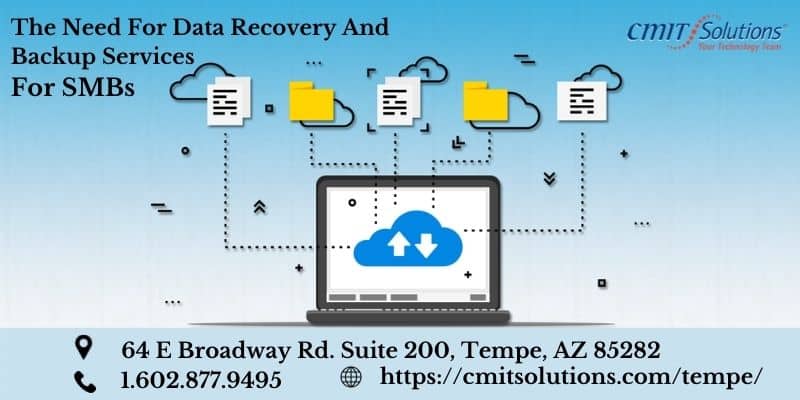So, you are a top SME that’s been doing pretty well. Business is good, and you are sitting in a comfortable spot. But, here’s the big question: Is your organization IT-compliant? If your answer is not a quick, resounding “Yes,” this article is for you.
Compliance has always been a top concern for many organizations, and more so right now. That’s because 82% of companies allow their employees to use their personal devices for work. As a well-known IT consulting company in Tempe, we at CMIT Solutions, keep in touch with the trending policies. Our experts say that BYOD (Bring Your Own Device) policies have become popular in recent years. As a result, we have new policies and compliance regulations cropping up to safeguard customer information against security threats.
Should You Worry About Being IT Compliant?
Yes, you should. Being IT compliant is a must, and there are no two ways about it. Compliance in business refers to following government laws relating to safety, health guidelines, and data security.
However, IT Compliance goes beyond securing data. It is all about how sensitive data is stored, disseminated, meets third-party standards, and is kept safe from hackers. Moreover, IT compliance varies with every country and industry.
Here are some general factors that align your organizational goals with IT compliance:
- Improving and maintaining consistent data security across various industries.
- Maintaining trust by safeguarding the personal and payment information of the customer.
- Taking measures to prevent data breaches that can result in massive losses.
- Implementing strict control measures to prevent data theft and data-related mistakes.
Going by these factors, the main objective of IT compliance is to identify and avoid all red flags that can result in loss of data.
Are all businesses IT-compliant?
Unfortunately, the Data Compliance Survey points out that not all businesses are serious about being IT compliant. The survey throws light on the fact that many organizations are flouting local data protection laws and regulations.
Here are some of the shocking facts that came to light after surveying a thousand professionals from various companies:
- 44.7% of the companies have resorted to changing their marketing technology to be compliant with data regulations.
- 62.4% revealed that their organizations were not compliant with many regulations, including important ones like GDPR, CDPA, and CCPA.
- 24.4% of the respondents did not know anything about the data regulations that applied to their industry.
- 37. 6% said they are fully compliant with all the applicable regulations.
- 5.4% of respondent companies from the USA are non-compliant with CDPA, CCPA, GDPR, and other regulations.
- Some respondent companies reported spending more than $10,000 to remain IT compliant.
In light of the above data, it is apparent that compliance and IT security are a serious concerns for many businesses and organizations.
What happens when businesses are non-compliant? Two words: BIG MISTAKE. If your organization is not IT compliant, you could be inviting a lot of trouble like:
- Unnecessary audits and inspections
- Hefty fines that can dent your financial stability
- Imprisonment of top executives.
- Destruction of your brand value
- Violation of your customer’s trust.
After such downfalls, it will be highly challenging to keep your business afloat.
While IT compliance is a must-have, it can also be challenging for companies, especially with new BYOD policies and the increase of IoT devices. So, let’s explore some of the most important IT compliance regulations and how to curb security breaches, legal issues, and potential fines.
Given below are eight of the most significant and widely applicable compliance regulations in the US and beyond.
8 IT Compliance Regulations to Safeguard Your Business
1. Health Insurance Portability And Accountability Act or HIPAA
The United States passed the HIPAA in 1996, and there have been updates and extensions since then. The regulation calls for healthcare organizations to ensure that digital health information is confidential, secure, and available when transmitted or stored. The Act also requires healthcare providers to take reasonable steps to protect their patient’s health data from threats, security breaches, and unauthorized use.
HIPAA is applicable to any organization that deals with healthcare, including:
- Insurance companies
- Healthcare institutions
- Businesses providing healthcare insurance for their employees
2. Payment Card Industry Data Security Standard or PCI-DSS
This regulation lays the guidelines for securely collecting, processing, storing, or transmitting payment card details. Enforced by the PCI Security Standards Council (SSC), this regulation applies to any organization that accepts, processes, and stores credit card information from its customers. The Council is an individual body comprising major payment card brands like Visa, MasterCard, American Express, JCB, etc. The law consists of twelve individual regulations that thwart any fraud and misuse of card details during transactions.
3. Federal Information Security Management Act of 2002 (FISMA)
The FISMA defines a framework of guidelines to protect government information, operations, and assets. It applies to all federal agencies, their subcontractors, and their service providers. The Act also affects any organization that operates information technology systems for federal agencies. Since information security is a part of national security, the Act directs federal agencies to protect all sensitive information.
4. Sarbanes-Oxley Act or SOX
The Sarbanes-Oxley Act applies to all public accounting firms, US public company boards, and management firms. While it was created to prevent another potential Enron or World Com scandal, the Act emphasizes how companies must record and store data. It also regulates how long they must retain certain information.
5. Gramm-Leach-Bliley Act or GLBA
The GLBA exclusively applies to financial institutions and all companies offering its customers financial products and services. It is also known as the Financial Services Modernization Act of 1999.
As per the Act, commercial and investment banks and insurance companies can operate within the same corporation. Financial institutions must also disclose what information they share with customers.
6. Family Educational Rights and Privacy Act or FERPA
Enacted by the US Government in 1974, FERPA protects all student information from when they enter school until they leave. According to this federal law, schools cannot release any information unless it has the written permission of the parents or the students. This law applies to all educational institutions that are funded by the US Department of Education.
7. The California Consumer Privacy Act or CCPA
This landmark regulatory act protects the privacy of all Californian residents. Under this Act, every Californian resident has the right to:
- Know about the information collected about them and how it is shared and used.
- Delete personal information collected from them (with some exceptions).
- Say no to the sale of their personal information.
- Non-discrimination for exercising their CCPA rights.
- Sue the organization if it violates CCPA.
- View all the saved data and the third parties with whom the data is shared.
The CCPA applies to organizations with a revenue of or above $25 million. Any business that possesses at least 50,000 individuals’ data must also be CCPA compliant. Does that mean CCPA is only for organizations in California? No. It applies to any organization that derives 50% or more of its annual revenue by selling the personal information of Californian residents.
8. The General Data Protection Regulation or GDPR
GDPR was framed by the European Commission to regulate organizational usage of customer data. More specifically, it regulates how companies gather, process, and manage personal data.
GDPR applies to any organization that collects, processes, or stores data about European citizens. Therefore it applies to all organizations that offer goods and services in the European Union.
GDPR has strict, clear-cut terms relating to privacy and data protection that instruct organizations to:
- Gather customers’ data only with their consent.
- Maintain a record of all data processing activities.
- Provide data breach notifications to customers.
- Safeguard the collected data to protect privacy.
- Ensure protection during the transfer of data across borders.
- Appoint data protection officers to oversee GDPR compliance.
You’d rather not mess with GDPR, as the fines for flouting it are significant. The penalty may comprise 4% of your annual review or 20 million Euros, whichever is higher.
Ensure Compliance And Stay Safe With The Law
To create a positive business reputation, your company must have a detailed IT compliance plan in place. IT Compliance is a continuous process, and even when formal compliance requirements are met, it is wise to continue improving security. You can rely on the IT security experts at CMIT Solutions, Tempe, to outline an IT compliance plan for your business. Give us a call to implement the right IT compliance requirements for your business.
Our IT Services
| Managed IT Services | Cybersecurity | Productivity Applications |
| IT Support | Cloud Services | Network Management |
| Compliance | Data Backup | Unified Communications |
| IT Guidance | IT Procurement |



